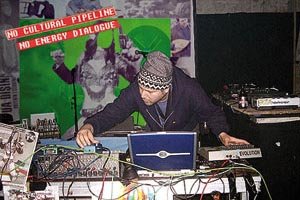Boundary signal / Grenzsignal
dal 14/1/2009 al 6/2/2009
Segnalato da
2/5 BZ aka Serhat Koksal
Ricarda Denzer
Martin Ebner
Mathias Fuchs
Bernhard Loibner
Bob Ostertag
Florian Schmeiser
xUrban Collective
Arye Wachsmuth
Florian Zeyfang
Fatih Aydogdu
14/1/2009
Boundary signal / Grenzsignal
Open Space - Zentrum fur Kunstprojekte, Wien
The exhibition contributes to a discussion not only focused on the "Sound" as a possible communicative level of artistic strategy, as a model of reflexion, as a border zone and an experimental field that goes beyond the act of speaking and beyond music. Additionally, it assumes a selected historical and political moment (time cut) as a source of material in order to produce statements and comments on events of the day.

curated by Fatih Aydogdu
Boundaries create regions and divide political entities, they limit economical growth as well as ecological exploitation they enclose geographic areas and show us the transgression of norms. Boundaries appear where one entity ends and another begins, yet it is simulatnuously permeable and contested.
On the other hand, the linguistic notion of boundary needs to be connotative neutral. «Boundary signal / Grenzsignal» in this context designates structural entities. A particular sound is indicating the boundaries of sentences, words, syllables, or morphemes, that has delimiting or detaching function marked as an /+/, where no conditional modification to be noted. This represents its feature therein exists that the usual position contingent variations do not take place in the coincidence.
If we refer to «boundary signals» in connection with sound, we could describe them as a unit consisting of smallest elements of sounds and sound modification that have a special tone signifying the communicative function of tact.
When we conceptulize language as a medium of finite notation and bounded codes, it can be perceived as a material for sampling. The situated differentiation and the modelling, or the generative apparatus of the language can thus be seen as a mechanism of sampling in the event that identical replication are considered as technically mediated and structurally represented units.
Sampling is the concept that is used as a programmatic imperative on electronic music, architecture, biotechnology up to the collage-techniques of the film and even on socio psychological identity models and politics. As a universal metaphor and contradictory model within itself, or as a technically mediated identical replication, Sampling implies a notion of the archive that evokes an awkward idea of the historic originality.
Behind the boundary, and/or beyond a syntactic boundary signal concerned with topografic and/or linear aspects; there is a «space» or an «interval» behind the boundary, and after a syntactic «boundary signal» respectively, that could be called «after-field». This is following a syntactic boundary signal (in whatever form) within a speaker‘s concrete hearable/readable expressions.
Positioned in the «after-field» «Boundary signal / Grenzsignal» contributes to a discussion not only focused on the «Sound» as a possible communicative level of artistic strategy, as a model of reflexion, as a border zone and an experimental field that goes beyond the act of speaking and beyond music. Additionally, it assumes a selected historical and political moment (time cut) as a source of material in order to produce statements and comments on events of the day.
sponsored by:
BMUKK
Stadt Wien – Kulturabteilung MA7
ERSTE Stiftung
and supported in kind:
Fluc
Monochrom
Opening*: 15 January 2009, 19.00 – 21.00
Open Space - Zentrum fur Kunstprojekte
Lassingleithnerplatz 2 - Wien



